 THE MACEDONIAN PEOPLE THE MACEDONIAN PEOPLE |
 Population distribution Population distribution |
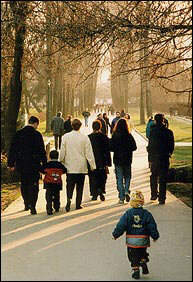
Macedonia's population of 2.1 million inhabitants represents a population density of approximately 81 persons per square kilometer. About 54% of the Republic's population live in urban areas. Over 25% of the population (over 500,000) is located in the valley area of the capitol of Skopje. The other major towns and population centers are Tetovo, Kumanovo, Bitola, Prilep, Ohrid, Stip, and Strumica.
Macedonians constitute about two-thirds of the population. Most Macedonians are members of the Macedonian Orthodox Church and speak a Slavic language known as Macedonian.
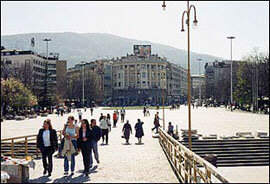
In terms of ethnic composition, according to the 1994 population census, 1,378,687 inhabitants of the Republic of Macedonia are Macedonians (66.43%), 478,967 are Albanians (23.08%) and 81,615 are Turks (3.9%). There are also 47,408 living in Macedonia as well as 39,865 Serbs, 8,571 Vlachs and some other ethnic groups.
Nearly 90% of the people in the Republic over the age of 10 can read and write. Approximately 70 percent of the population also complete secondary or higher education. The University of Skopje (founded in 1949) and Bitola University (1979) are the republic's two main universities. The new Islamic University in Skopje began its work in September 1997.
 Religion Religion |
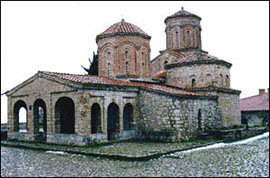
Two-thirds of the population of Macedonia are Orthodox
Christians, 30% are Moslems, 0.5% Roman Catholics
and 2.8% are of other religious affiliations. The
Macedonian Orthodox Church has played an important
role in the long struggle of the Macedonian people
for the preservation of its national identity, as
well as in its education and culture. Its roots
are ancient. The Archbishopric of Ohrid was the
first autocephalous Slav Church. It was established
by St. Clement and St. Naum, outstanding students
of the brothers Ss. Cyril and Methodius. In 893
A.D., St. Clement of Ohrid became the first Slav
archbishop. |
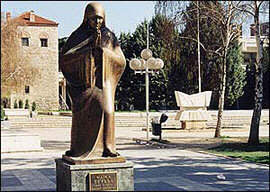
Today the Macedonian Orthodox Church perpetuates the traditions of St. Clement's Archbishopric of Ohrid. It is headed by the Archbishop of Ohrid and Macedonia and a Holy Synod of Bishops consisting of six bishops. The number of church eparchies in Macedonia is the same. The Macedonian Orthodox Church has played an extremely important role in uniting and organizing Macedonian Community in Australia, the United States and Canada, and recently also in West European countries. The Australian Eparchy and the Canadian-American Eparchy comprise 44 churches and 2 monasteries. The activity of the Macedonian Orthodox Church in foreign countries is of exceptional educational and cultural assistance and of irreplaceable importance for the unity of Macedonians, their better mutual understanding and the preservation of their national traditions and constant concern about their national identity. Together with the Association of Expatriates, the Macedonian Orthodox Church plays a decisive role in maintaining constant links between the expatriates and their homeland.
Macedonia has about 1,200 churches and 425 mosques. There is a Roman Catholic church in Skopje, and the other religious communities have their own places of worship in the capital and in other towns in the Republic.
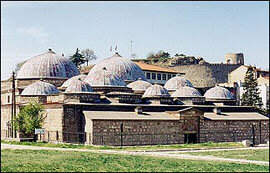
The Orthodox and the Islamic religious communities have each a secondary religious school in Skopje. There is an Orthodox Theological College also in Skopje.
The believers from all confessions solemnly celebrate their religious holidays, and the most important of these are non-working days.
 The Language The Language |
The Macedonian language belongs to the Slavic group of languages. It is closely related to Serbian and Bulgarian, but it is not a dialect of neither one of them, it is a language on it's own.
The first Slavic language used for literary purposes was the Old Church Slavonic, written in the Cyrillic alphabet devised by the Macedonian missionaries Cyrill and Methodius in the 9th century. As individual alphabets were later developed for the various Slavic languages, the choice was entirely made by religion. Orthodox Macedonians adopted the Cyrillic alphabet.
Bulgaria refuses to recognise Macedonian as a separate language from Bulgarian. Greece claims an exclusive right to the name 'Macedonia', as it was the homeland of Philip of Macedonia, father of Alexander the Great. |

